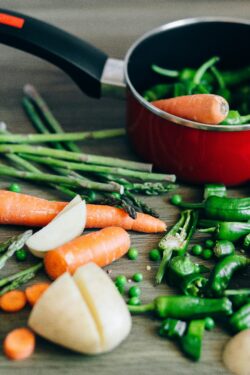Nutrition for Arthritis

Arthritis is caused by inflammation, therefore an anti-inflammatory diet can help reduce the inflammation and the pain associated with arthritis. Any time you see the suffix “itis” you can associate it with inflammation since “itis” means inflammation.
The parts of the body that are affected by arthritis are the places where bones join, such as the knees, feet, toes, wrists, hands and fingers. The 2 most popular types of arthritis include osteoarthritis and rheumatoid arthritis.
 Osteoarthritis (OR) is caused when the cartilage that covers the end of the bone deteriorates. It causes the bones to rub together, which leads to inflammation and pain. Genetics, injuries, joint overuse, aging and being overweight can all cause arthritis. Most people think of OA as a degenerative disease that will only worsen with time, however proper nutrition has the power to halt and reduce arthritis symptoms dramatically.
Osteoarthritis (OR) is caused when the cartilage that covers the end of the bone deteriorates. It causes the bones to rub together, which leads to inflammation and pain. Genetics, injuries, joint overuse, aging and being overweight can all cause arthritis. Most people think of OA as a degenerative disease that will only worsen with time, however proper nutrition has the power to halt and reduce arthritis symptoms dramatically.
Rheumatoid Arthritis (RA) is caused by the lining of the joint capsule becoming inflamed. The joint capsule, known as the synovial membrane, releases enzymes that dissolve bone and cartilage in the joint, further worsening the disease over time. Genetics and hormonal imbalances are said to be two causes of RA, although doctors aren’t really sure why it occurs. The good news is that nutrition can dramatically reduce the pain associated with RA.
Nutrition for Arthritis
When considering nutrition for arthritis, it comes down to this: Any food that fights inflammation can help arthritis, and any food that increases inflammation can worsen it. The results of both types of food can be dramatic, either reducing pain considerably or making it much worse.
Nutrition for Arthritis Step 1: Inflammatory Foods to Avoid
Saturated Fats – The more you reduce saturated fats in your diet, the better your arthritis will feel. Saturated fats include fatty cuts of beef and pork, chicken skin, whole milk, ice cream, butter, cheese, lunch meat, sausage, bacon and a number of products that contain palm oil or palm-kernel oil, such as certain pre-packaged baked goods, processed foods and non-dairy creamer.
Omega-6 Fatty Acids – While omega-3 foods are extremely important for people who have arthritis, omega-6 foods will only make the condition worse. This is because high amounts of omega-6 fatty acids trigger the inflammatory response in the body, while diminishing the bodies’ omega-3 reserves at the same time. Reduce your intake of the following foods in order to reduce your omega-6 intake: corn oil, soybean oil, sunflower oil, safflower oil, cottonseed oil, canola oil, fast foods, deep fried foods, dips and salad dressings, processed snack foods and baked goods, mayonnaise, margarine, butter-flavored microwave popcorn, granola bars and many energy bars. By counter-acting the amount of these types of foods you eat with larger amounts of foods that contain omega-3 fatty acids, you can improve your arthritis significantly.
Trans Fats – Trans fats are one of the unhealthiest things you can eat, especially for people with arthritis. Trans fats are often in processed foods, baked goods and margarine. Look on the nutrition label for trans fats or partially hydrogenated oils to determine if a product contains trans fats, and avoid fast food, which are high in trans fats.
White Flours – These refined carbs cause pro-inflammatory compounds to grow within the body. Limiting these foods can help reduce the inflammation associated with arthritis. Stay away from foods like white bread, rolls, crackers and baked goods made with white flour, pizza dough, soft pretzels, muffins, donuts, pastries, breakfast cereals, pasta that is made with white flour and white rice. Make the switch to while grain products and you will notice an improvement in your arthritis.
White Sugars – White sugar (otherwise known as table sugar) is another form of refined carbs that sets off an inflammatory response in your body and creates free radicals at the same time. Stay away from baked goods, soda, candy and sweetened fruit juices. Also stay away from artificial sweeteners and high fructose corn syrup. You can always substitute healthy options such as stevia, honey, agave nectar, or real maple syrup.
 Fried Foods – Many fried foods are fried in hydrogenated oils, which are trans fats that cause inflammation. Plus, fried foods are one of the fastest ways to gain body fat. Being overweight can add excessive stress to the joints, making the pain worse. Body fat is also metabolically active, which means it produces hormones and chemicals that increase inflammation. Stay away from foods like fried chicken, French fries, deep-fried foods and donuts. When cooking at home, choose different cooking methods such as baking, steaming or sautéing.
Fried Foods – Many fried foods are fried in hydrogenated oils, which are trans fats that cause inflammation. Plus, fried foods are one of the fastest ways to gain body fat. Being overweight can add excessive stress to the joints, making the pain worse. Body fat is also metabolically active, which means it produces hormones and chemicals that increase inflammation. Stay away from foods like fried chicken, French fries, deep-fried foods and donuts. When cooking at home, choose different cooking methods such as baking, steaming or sautéing.
Processed Foods – America has turned to processed foods as a primary food source because of the simplicity and convenience these foods offer. The problem with this, however, is that most processed foods are void of nutrients and actually contain harmful chemicals and ingredients. This can increase inflammation and break down our natural defenses. Stay away from pre-packaged meals and snack foods and processed meats like sausage or lunchmeats. Fill you diet with as many natural foods as you can such as fruits, vegetables and whole grains, and make as many home cooked meals using real whole foods ingredients as you can.
Dairy Products – The protein contained in dairy products has been shown to aggravate the tissue around the joints, so it can make arthritis worse for people who suffer from it. Try switching to almond or rice milk instead of cow’s milk, and reduce your cheese intake.
Salt & Preservatives – Salt and preservatives can often lead to inflammation in the joints, so reducing your intake of these substances can often help people who suffer from arthritis. Reducing your processed food intake is one easy way to reduce your consumption of salt and preservatives since those are the foods that contain them the most.
Alcohol & Tobacco – Alcohol and tobacco introduce toxins into the body, which put stress on our bodies, particularly our joints. Reducing your alcohol consumption (and sticking to wine) and quitting smoking is important for anyone who is trying to overcome any disease.
Nutrition for Arthritis Step 2: Anti-Inflammatory Foods to Add Into Your Daily Diet
Omega-3 Fatty Acids – For many people, adding omega 3’s into their diet on a daily basis is the main reason they enjoy drastically lower arthritis pain. This is because omega 3 fatty acids reduce inflammation by stopping the production of the enzymes that eat away at cartilage. Foods that are high in omega-3’s are flaxseeds, chia seeds, edamame, walnuts, salmon, rainbow trout, sardines and anchovies.
Extra Virgin Olive Oil – Extra virgin olive oil is a healthy fat source that is rich in oleocanthal, a compound that blocks inflammation in the same way that over-the-counter painkiller do.
 Antioxidants – Free radicals wreak havoc on the cells in our body, causing damage and inflammation. Antioxidants are important nutrients that combat the oxidative stress these free radicals put on our bodies. They are so powerful that research has shown they may help prevent, slow or reverse arthritis altogether. There are many different antioxidants. Some of the most powerful include:
Antioxidants – Free radicals wreak havoc on the cells in our body, causing damage and inflammation. Antioxidants are important nutrients that combat the oxidative stress these free radicals put on our bodies. They are so powerful that research has shown they may help prevent, slow or reverse arthritis altogether. There are many different antioxidants. Some of the most powerful include:
- Vitamin C – oranges, lemons, strawberries, pineapples, kiwi, kale, broccoli, bell peppers, Brussels sprouts, cauliflower, kidney beans
- Vitamins D – liver, wild salmon, herring, cod, shrimp, sardines, anchovies, fortified milk, eggs, dark green leafy vegetables, re, yellow and orange fruits and vegetables
- Beta-carotene – sweet potatoes, carrots, butternut squash, pumpkin, cantaloupe, apricots, red peppers, kale, spinach
- Anthocyanins – blackberries, raspberries, blueberries, strawberries, cranberries, cherries, grapes, plums, apples, red onions, eggplant,
- Quercetin – kale, broccoli, leeks, onions, tomatoes, blueberries, elderberries, grapes, red apples with skin
- Selenium – Brazil nuts, tilapia, cod, tuna, crab, oysters, shrimp, whole grains, turkey, lean beef
Ginger – This medicinal herb contains anti-inflammatory compounds called gingerols that help reduce inflammation in the same way that pain medications do. Try ginger tea or buy some ginger root and add it to stir-fry’s, desserts and more.
Turmeric – This medicinal herb, otherwise known as curcumin, suppresses the inflammatory response in the body. It is the main ingredient in capsaicin rubs and curry, and it is effective when used externally or internally.
Green Tea – Green tea contains high amounts of catechins called epigallocatechin-3-gallate (EGCG), which help to halt the production of inflammatory chemicals in the body. It has also been shown to prevent cartilage breakdown.
We hope this Nutrition for Arthritis article will help you get a handle on your arthritis pain. For more info on managing arthritis, click here.
Share this Image On Your Site
Sources:
Photo Credits:
Woman on the Phone: freedigitalphotos.net, Ambro



